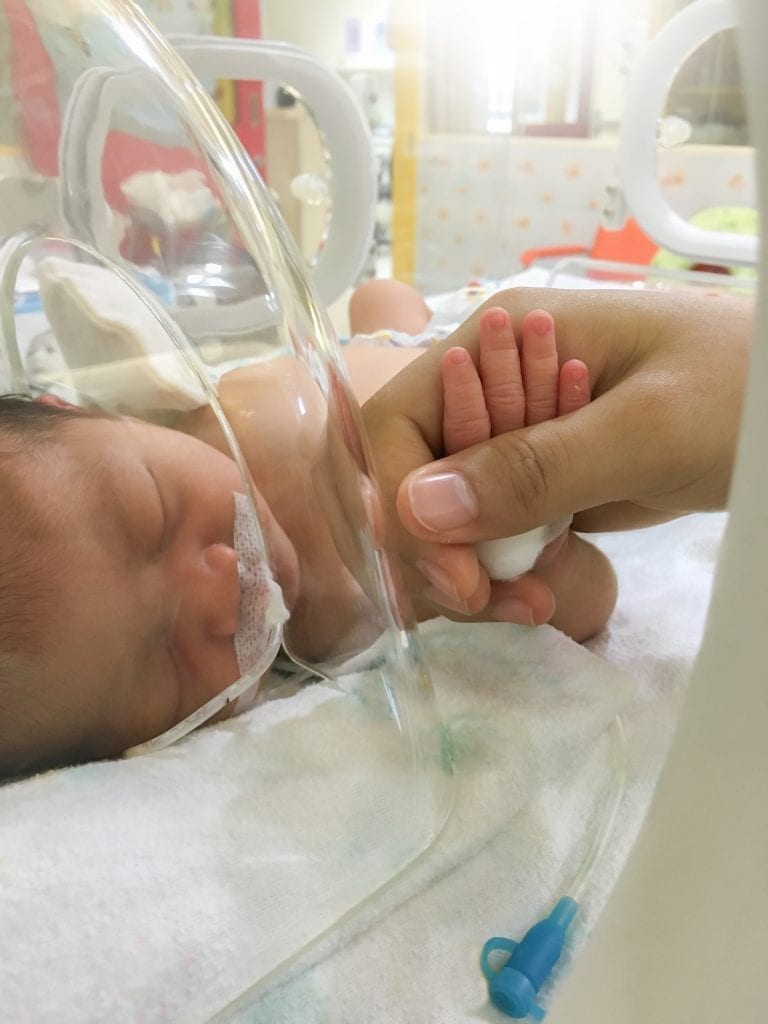Preterm Birth Planning
Plan for the Possibility of Preterm Birth
A new survey suggests parents want to know the risks of prematurity affecting a current pregnancy, as well as information from their healthcare providers about the complications of baby being born early.
Would you want to know if you’re at risk for birthing early? While most pregnant women eagerly await those first contractions, anxious to finish the marathon of pregnancy, when baby comes early many moms feel unprepared for the realities of prematurity.
“My son Elijah was born after only 30 weeks and spent 91 days in the Neonatal Intensive Care Unit (NICU). I felt so alone and unprepared,” said Southern California mom Lucy Loomis. “No one in my immediate circle of family or friends had experienced a preterm birth—I didn’t know who to turn to for advice. It would have been great to have known during my pregnancy that I was at risk for a preterm birth.”
Lucy would have used that information to prepare for what ultimately became her journey toward the birth of her son: Extended periods of bed rest, and that Elijah would need NICU-level care. “When I got to see him for the first time, of course I couldn’t hold him as he was still intubated, and he had all of these monitors attached to him. That was very hard,” Lucy recalls.
“There was a lot of fear. I did not know what to expect; was he going to be okay? It was a very scary time for my husband and myself. I found ways to encourage myself, like engaging with the nurses and other moms on the unit. They would ask me how I was doing and that played a big role in how I felt too because they were so nice to me,” Lucy recalls, acknowledging that during this time she also had the extra stressor of a young daughter at home to provide care for as well.
Further reading: The Best Way to Labor & Birth Your Baby
“The information would have been useful to prepare for my pregnancy and delivery journey, including the possibility of being on bedrest for a long period of time, or that my baby might need to be intubated. It would have alleviated some of the fear, trauma and anxiety that I went through,” she said.
Preterm Birth
What you would do if your baby was born early—premature—weeks or more before their due date? How would you manage your job? Current family obligations? One in 10 babies in the US are born before term (37+ weeks), according to the CDC, and half of these births are among pregnancies with no apparent risk factors for prematurity, according to the New England Journal of Medicine.
Truth is expecting parents aren’t well informed about the risks of preterm birth, but want information from their healthcare providers to prepare and educate themselves, according to a survey conducted by San Diego-based Miracle Babies Foundation, a nonprofit organization that supports NICU families. In the survey, “Premature Risk Education to Empower Moms-to-be with Information Early” (PREEMIE), parents told researchers they want to learn:
- If their baby is at risk for prematurity based on risk factors associated with premature birth, including previous preterm birth, prior miscarriage, carrying twins or multiple babies, IVF, family history, and health and lifestyle factors, among others (95%)
- Premterm birth is the #1 cause of infant death and illness (77%)
- Women without risk factors account for up to 50% of preterm births
Even if their pregnancy care provider can’t prevent preterm birth, most parents want to know if they would ultimately birth their baby early (97%). Yet, more than half of parents said they never discussed the possibility of prematurity with their pregnancy care provider.
ALSO READ: How To Bathe Your Premature Baby
Experiencing Prematurity
Following a preterm birth, especially with an extended NICU stay for baby, moms “can feel isolated and alone; their life is turned completely upside down, says Dr. Sean Daneshmand, founder of Miracle Babies. He encourages women to ask their pregnancy care providers about preparing for a possible premature birth. “When a baby is born preterm or with medical complications, that family’s life changes drastically,” he shares. “Stress becomes a near-constant emotion, difficult decisions must be made, and life in the NICU becomes a reality.”
Miracle Babies provides Southern California families with financial aid for transportation, childcare and other needs families have when confronted with prematurity. “We provide them with care bags because the simple things really matter: A toothbrush, a Kind™ bar, lip gloss . . . many simple things a mom would need when they’re in the NICU,” Dr. Daneshmand says, recounting how this simple kindness has a lasting impact.
Beyond those “simple kindnesses,” Dr. Daneshmand has one message for moms and their families: Ask your pregnancy provider about your risks for prematurity, and be ready and informed should you experience what 1 in 10 parents go through every year when their baby is born preterm.
Read our articles on avoiding early birth, and caring for your Preterm Birth, Visit Born Too Early (Prematurity)
RELATED TOPICS
Late Preterm Baby: How To Care For
Baby Premature: How To Protect Them
Pumping For your premature Baby
Further Reading: Newborn Skin Care Basics and visit our Diapering Zone where you can see our Diaper Rash Guide.






Comments are closed.